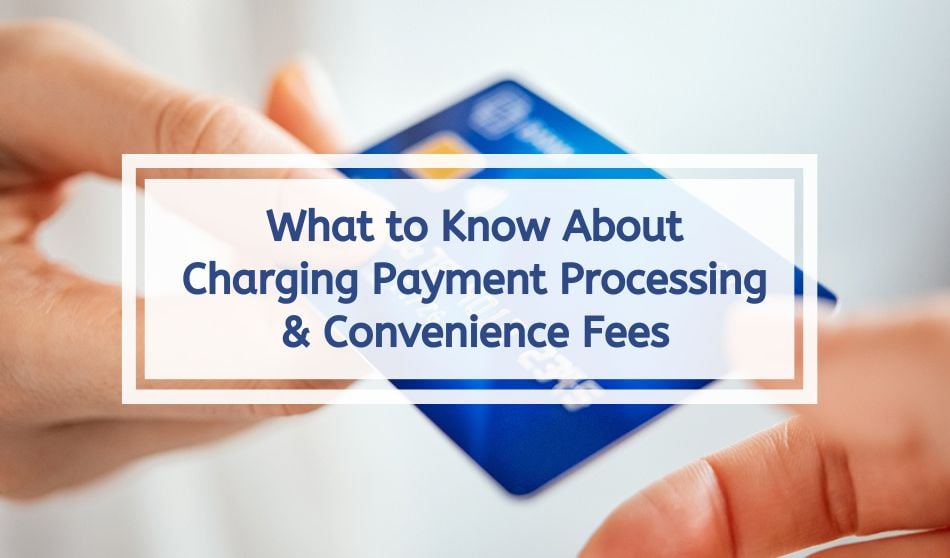
Whether residential or commercial real estate, landlords and property managers across the country benefit from being able to offer multiple payment options, additional services, and amenities to their tenants to differentiate them from their competition. On the flip side, some landlords choose to charge convenience fees on specific options as a way of reimbursing their costs or as a way to generate additional revenue while providing a needed service or amenity.
In either case, before charging your tenants for convenience fees, surcharges, pass-through,, and direct billed services, it’s essential to be familiar with the pros and cons of those choices and the regulatory, compliance, and reporting requirements associated with these types of charges.
Electronic Payment Processing Transaction Fees
Landlords want to offer tenants the best options for paying their rent and other charges conveniently. It’s one of the main factors of providing landlord software that tenants love.
To offer electronic rent payment options, landlords must open a merchant account with a payment processor who, in turn, will charge the landlord a processing fee for each transaction.
Regarding tenant-based transactions, there are two types of merchant processing fees a property manager should expect when collecting rents: credit card processing fees and Automated Clearing House (ACH) transaction fees.
Definition Corner
ACH – Automated Clearing House: As the name suggests, these automated payments are scheduled and authorized by the person or organization requesting the withdrawal from a financial institution and processed in a batch. An ACH batch processes the exchange of electronic fund transactions between financial institutions.
Due to the nature of batched and processed transactions, ACH transactions are not real-time settlement payments but instead rely on the timing of funding and are at the mercy of each financial institution’s processing time.
For more payment processing definitions, check out this helpful resource: Rental Real Estate Terms to Know About Payment Processing
Let’s go over the five basic types of payment processing fees one might encounter in the rental real estate industry:
1. Credit Card Processing Fees
Credit card processing fees are charged to a landlord for every incoming transaction. The cost is determined by the merchant provider’s relationship with the credit card processor and the type of credit or debit card used.
What’s the difference between a convenience fee and a surcharge?
These terms are often used interchangeably. You’ll likely recognize that ‘convenience fee’ is most often used in property management software systems. Often in retail, the term ‘surcharge’ is used to mean reimbursement for the processing fee expense. Whereas ‘convenience fee’ would be a charge for the privilege of using a different payment method option (which may include a high enough fee that reimburses the expense as well).
Can I charge my tenant a credit card convenience fee to offset my processing fee expense?
That depends on your state regulations. Most states allow you to charge a credit card convenience fee – but not all.
According to a USA Today article:
“In some states, retailers can’t add surcharges or convenience fees. Here are the five states where it’s illegal: Colorado, Connecticut, Kansas, Maine and Massachusetts.
While it’s illegal for businesses to charge credit card surcharge fees in these states, there are two things to note. In Maine, government entities can impose credit card surcharges. Additionally, all states are allowed to offer cash discounts to avoid these fees. That includes the above five states. Offering a cash discount may encourage more customers to pay with cash, and it can help both the business and the customer avoid additional fees.”
According to a LendingTree article:
“Ten states prohibit credit card surcharges and convenience fees: California, Colorado, Connecticut, Florida, Kansas, Maine, Massachusetts, New York, Oklahoma and Texas. It is illegal for merchants to add any surcharges to credit card transactions or charge convenience fees to nontraditional payment methods in these states.”
One indicates a ten-state ban on convenience fees, and the other five states. Although these two articles are fairly current, after some research we found articles across the internet that were outdated.
With conflicting and old referenced information, how can you be sure you are in compliance and are allowed to recoup your credit card processing fee or make an additional profit from the transaction? Additionally, because these articles are retailed focused, they don’t mention if the ban applies to collecting rent payments. You leave yourself vulnerable if you rely solely on internet articles, including this one.
The best advice is to seek the advice of experts. Check with the real estate board and consumer affairs in your state to find out if you can charge a fee to your tenants and applicants to recover your costs for credit card processing.
2. ACH Transaction Fees
ACH transaction fees are also charged per transaction to the landlord by the merchant service provider to pay for the ACH service. The technical aspect of how funds are routed from the tenants’ financial institution to yours is complex. The merchant service provider charges a fee for making that happen quickly and securely.
ACH transaction fees are governed by different financial regulations than credit cards. Because the credit card network does not regulate ACH, you should be able to charge a convenience fee for the privilege of paying rent electronically. However, many tenants expect online payment options as a free amenity, and often tenants are more likely to pay rent on time when given an online opportunity, so weigh the pros and cons carefully if you wish to charge for the service.
2. Property Management Transactions
In addition to collecting tenant-related payments by ACH, depending on the features provided by the property management software, landlords and property management companies can use ACH transaction processing to help with:
- Vendor payments
- Owner disbursements (aka owner distributions)
- Owner contributions (such as expense reimbursements and property reserves)
It’s important to note that transaction fees can add up quickly with all the available ways to collect and pay out funds via ACH. The best property management software will find ways to help landlords reduce those costs by subsidizing some or all of the ACH transaction fee expenses and monthly merchant processing fees.
If you are paying fees for ACH transactions, check with your landlord software provider to ask if they offer discounts or bundled pricing that reduces those ACH transaction expenses. If you pay too much in ACH transaction fees, it might signal that it’s time to shop for a new property management software.
4. Compliance and Error Fees
Merchant service providers incur costs associated with transactions that fail and pass those fees on to the landlord or property management company. Often those can be passed on as a charge to the tenant so that you can recover your expense. Examples of error transactions include non-sufficient funds, returned payments, chargebacks, and bank error fees.
The National Automated Clearing House Association (NACHA), which regulates the ACH payment network, requires information verification for every tenant, vendor, or owner that might receive or send funds via ACH through a property management platform. These inexpensive one-time fees do a pre-validation of information to reduce the risk of fraud and errors.
5. Fees for Other Tenant Payment Options
Electronic payments can also come by way of using a Cash Payment Network in addition to or instead of a merchant processor. A Cash Payment Network enrolls the landlord into their system, and then the landlord provides the tenant with a payment voucher.
The landlord will likely need to pay a one-time enrollment fee and use property management software that connects to that cash payment network.
When a tenant takes the printed or electronic voucher (available from their tenant portal or landlord) to the cash payment location (often a shopping or convenience store in their neighborhood), that location will charge the tenant a flat processing fee to use the service.
Final Advice
Charging fees for transaction errors that a tenant could have avoided, such as an NSF, are common practice. But seek out the advice of experts in your state (such as a real estate board, consumer affairs, and the housing authority) before charging your tenants, vendors, and owners a fee for the privilege of sending or receiving funds (whether or not you make a profit or break even) to make sure you are in compliance with your state regulations.
Related Reading For You:





